FAMILY AND SCHOOLDAYS
Charles Leatherland's ancestors came from Northampthonshire and Warwickshire. The family has been traced back to the seventeenth century. It was not a grand family, most of his ancestors were farm labourers, weavers, and brickmakers. The earliest ancestor is Edward Leitherland whose children were baptised in this church, St Andrews in Clay Coton (now a private residence) between 1652 and 1668.
For an in-depth look at the family history please see my website at www.leatherlandancestry.info
GREAT GRANDPARENTS : Samuel and Elizabeth Leatherland
Charles Leatherland's great grandfather, Samuel Leatherland, was born around 1791 in Kilsby, Northamptonshire.
In 1818 Samuel married Elizabeth Langton in Claybrooke, Leics. Samuel worked as an agricultural labourer. School records for his children show that in the 1820s/30s he lived in Pailton, Warwickshire. In each census from 1841 to 1871 he remained in Pailton or the neighbouring village of Monks Kirby. Samuel died in Pailton in 1880 aged 90.
GRANDPARENTS : Samuel and Susanna Leatherland
Samuel Leatherland was born in Pailton, near Rugby, around 1835. In the 1851 census he was 15 years old living in Monks Kirby, Warwickshire and working as a farm servant with the family of Thomas Winterton, a farmer with a 230 acre farm who employed twelve farm labourers.
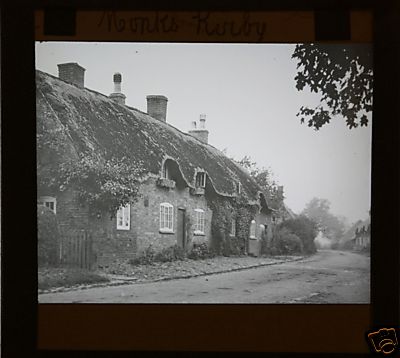
Monks Kirby Cottages
In the 1861 census Samuel was living in Farm Town in Coleorton, Leicestershire. He was now 24 years old and worked as a shepherd for Joseph Faux, a farmer of 238 acres of land who employed nine labourers and two boys. There were five other servants living with Mr Faux including a housekeeper, a dairy maid, a cow man, and a carter.
In October 1866 Samuel married a young servant called Susanna Foster. Susanna was only 17 years old. She worked at the local manor house, Coton House, in Churchover. Susanna had her first child three days before she got married but sadly the child died within a month. But in 1867 they had a son, William, and in 1870 another son, John Edward, who was Charles Leatherland's father. Samuel and Susanna lived in Churchover for the rest of their lives. They had twelve children : nine boys and three girls.
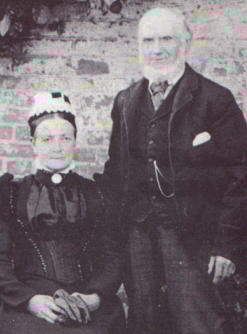
Samuel and Susannah (1900s)
In the 1901 census Samuel was 64 years old. His occupation was a county council roadman. His grandsons recalled that he was a roadsweeper and road maintenance man on the Lutterworth Road and that he rode around the village on a tricycle. Only two of his children were still living with him : 18 year old Frederick aged 18 and 10 year old Edith aged 10.
Samuel Leatherland died aged 75 in Churchover in 1910. He is buried in the churchyard where there is a gravestone. Susanna died in 1927.
PARENTS : John Edward and Elizabeth Leatherland
John Edward Leatherland was born in 1870. He grew up in Churchover, a small village four miles north of Rugby. He joined the army in his late teens, serving in the 2nd Battalion of the Royal Warwickshire Regiment in India, Ceylon (Sri Lanka) and Afghanistan as a drummer boy and later as a bandmaster. He served in the army for ten years.
In 1897 he married Elizabeth Abbis in Birmingham. Elizabeth was the daughter of Walter Abbis, the village blacksmith in Harlington, Bedfordshire. They had four children all boys : Charles, Arthur, Will and John. Sadly, Elizabeth died when she was only 34 years old.
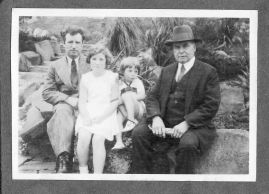
Their first son was CHARLES EDWARD LEATHERLAND who was born in 1898. At this time, his father was the bandmaster at Gem Street Reformatory School in Birmingham. Three years later the family moved to Dinas Powis, Cardiff. His father worked there as a gardener at Cardiff and Barry Truant Industrial School. The family lived in the School Lodge.
His second son Arthur Samuel was born in Cardiff in 1901. By 1902, when his third son William was born, the family had moved back to Birmingham. At that time John was working as a valet and domestic servant
Their fourth son, John Henry, was born in 1907. In 1908 their mother died of Bright's disease.
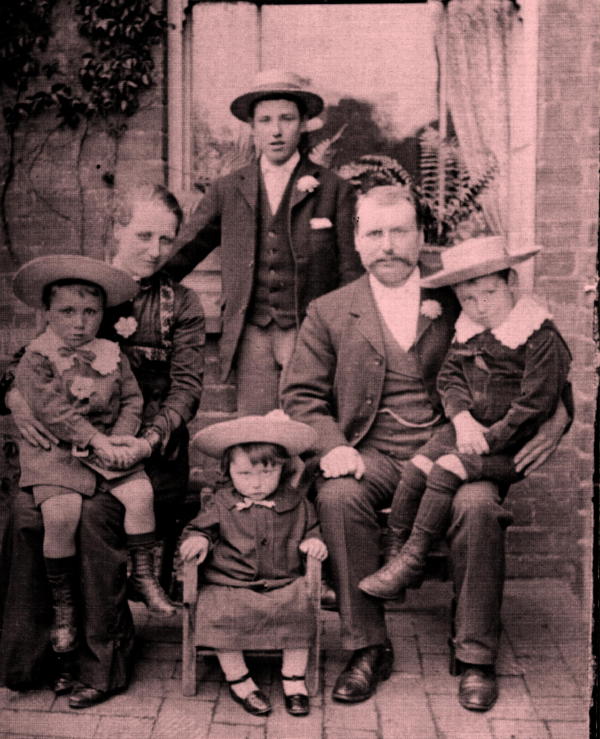
John Edward Leatherland with wife Elizabeth, sons Arthur (left), Will (middle) amd Charles (left) and brother-in-law Charles Abbis at the back. (1904)
After his wife's death, John advertisied for a housekeeper to help look after his four young boys. Rosina Atkins, a Londoner, got the job and four years later she married him. They had a daughter, Rosa.
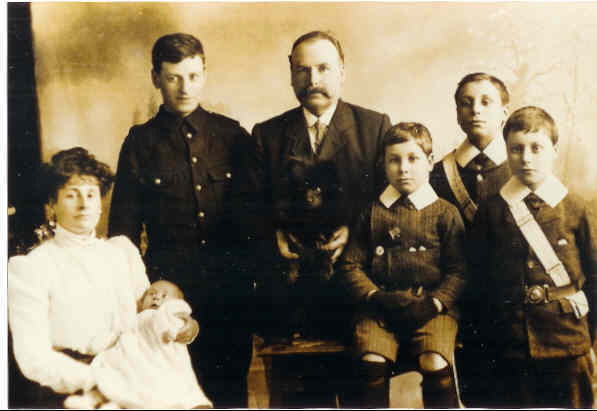
Charles Leatherland (second from left) aged about 16 with his father, step-mother, brothers and step-sister (1914)
Later on John worked as valet for the family of a wealthy solicitor in Edgbaston, Birmingham. His duties included looking after the Butlin’s elderly mother who had mental health problems and generally doing odd jobs.
In 1917 he joined Cadburys, the chocolate makers in Bourneville. He worked in their packing and case making department and as a joiner. He remained at Cadburys until he retired in 1930. After his retirement he moved south to live near Charles and his family. He died in 1945.
SCHOOLDAYS
Charles Edward Leatherland was born in April 1898. He grew up in Birmingham with his three younger brothers. When he was 10 his mother died.
Charles went to Harborne School, the local council elementary school. He was a bright boy and won essay prizes run by the Birmingham Evening Post.
"In 1914 I was 16 years old. We were a happy family but faced with the hard task of making ends meet. So at the age of ten I had a newspaper round, bringing in half a crown a week. At eleven I went as a boot-boy in the house of a local JP. This involved cleaning half a dozen pairs of shoes, a dozen knives forks and spoons, getting in half a dozen buckets of coal, stoking the heating furnace and grooming a large collie dog who lived in what looked like a lion's cage. And then rushing off two miles to school before nine o'clock. There were similar tasks in the evening, and on Saturdays there was the lawn to roll for tennis and the cleaning of over twenty windows".
(Leatherland war memoirs, Liddle Collection 1977)
In a speech to the House of Lords in 1966 he remembered his religious upbringing :
" I had an excess of compulsory church-going in my early days. When I was quite young I was a choir boy, and a good little choir boy. Other people thought so as well, because one Sunday night one anonymous member of the congregation put sixpence in an envelope and sent it round to me at the vestry door, saying it was in appreciation of the way I had sung the solo that night."
"I was one of those boys who had to go to St. John's morning service ..... Sunday school at St. Monica's in the afternoon.... and who had to sing in the choir at St. Monica's on Sunday evening. Every Wednesday evening there was the Church Lads' Brigade. On one evening there was the Band of Hope. Every Friday evening there was the choir practice. Then when I was 16 and went in the Army, there came the customary round of compulsory church parades. I ought to add that in later life I bought an old rectory in a little Essex village and spent the twenty happiest years of my life there. But I bought it solely out of worldly considerations, although many of my letters used to come addressed to "The Reverend Charles Leatherland"..."
During his newspaper delivery round, he used to meet a lamplighter who would discuss socialism with him. After leaving school he worked as a shorthand typist in the office of a golfing magazine. He spent his first months' wages on a pair of boxing gloves. Leatherland did not get on very well with his step-mother so, soon after beginning work, he left home and lived in lodgings in Birmingham.
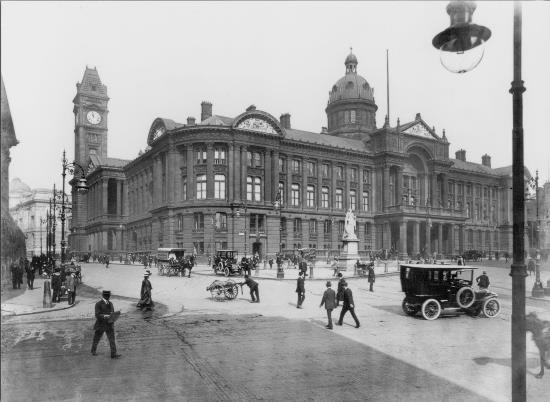
Victoria Square Birmingham 1912
Charles began to attend evening classes. He taught himself shorthand and reached 120 words a minute by the age of 14. This helped him to get his next job as a clerk typist for Birmingham Council. His wages were £26 a year. Then in the autumn of 1914 war broke out.
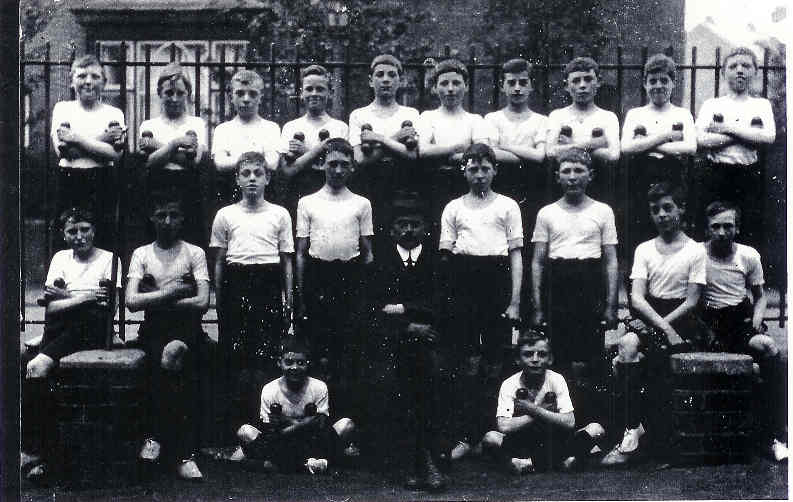
Charles Leatherland (top, far right) at Harborne School, Birmingham c.1906